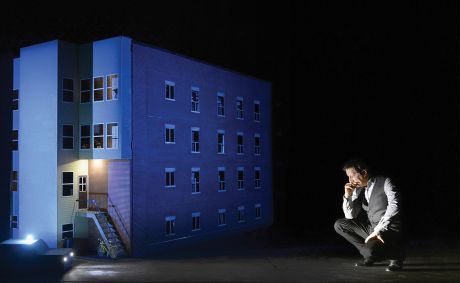Arts
You are here
Speak White: Robert LePage remembers Quebec

February 3, 2018
Je me souviens. The Quebec license plate is the backdrop to renowned theatre-maker Robert LePage’s study of memory, “887.” We remember – but what?
Named for the street address of his childhood apartment in Quebec City, it is a true story of the Quiet Revolution – first performed mostly in English, to a largely anglophone audience, when it was commissioned by the Toronto 2015 Pam Am Games. It went back to Toronto by popular demand in April 2017, and played at Ottawa’s National Arts Centre in January 2018, again in English with some subtitled French, to a mostly anglophone audience. “887.” It can be purchased as a book in French, with an English version slated to be published in August 2018.
In this solo show, LePage is unable to memorize the 1968 poem “Speak White” by Michèle Lalonde, about the forcing of English on Quebec, for an official 40th commemoration of the founding of Quebecois poetry. He tells us how he created a memory device: the apartment where he grew up in the 1960s, from the emergence of the Quiet Revolution to the FLQ crisis. The places of his childhood are enacted onstage with scale models.
Memory can be inhibited by a performer’s lack of resolution with a text. But LePage’s real lack of resolution may be with the audience he had to memorize the poem for: federal and provincial politicians, dignitaries and media. He says the only person worthy to recite the poem would be his taxi driver father who worked long hours to give the family a better life. By creating a memory device based not only on the Quebec of the 60s but also the working-class world he grew up in, he brings the poem to life.
Language and identity are tied up with class: LePage tells an anecdote about going to a Quebec Conservatory performance to hear theatre students perform Aristophanes. He comments on how beautiful their French diction is to the director, and says, well maybe in our day it was all about physical theatre for the masses and not so much about diction? The director responds: I can assure you the curriculum has not changed. What has changed is those who can afford it.
It is this class anger that is at the heart of the poem “Speak White,” which starts with the words “We are an uncultured, stammering people.” The Quiet Revolution changed that in many ways, but this is at the heart of the contradiction LePage faces in reciting the poem to a room of dignitaries, politicians and press far removed from the world that produced it as a cry of anger in 1968.
That world is brought to life from a 12 year-old’s conversation with his father while the FLQ manifesto was being read live on TV, where he can’t understand his father saying “they’re right in what they say, but not in what they do,” to the same 12 year old having his newspaper bag searched by a soldier under Canada’s War Measures’ Act: “I wanted to say, you idiot, the bombs aren’t in my bag but in my head.”
And in the end it is the poem itself that explodes like a bomb:
A bit stronger then, speak white
Raise your foremen's voices
We're a bit hard of hearing
We live too close to the machines
And we only hear the sound of our breathing over the tools
Speak white and loud
So that we can hear you
From St-Henri to St-Domingue
What an admirable tongue
For hiring
Giving orders
Setting the time for working yourself to death
And for the pause that refreshes
And invigorates the dollar
Speak white
Talk to us about production profits and percentages
Speak white
It's a rich language
For buying
But for selling
But for selling your soul
But for selling out
It is a universal language
We were born to understand it
With its teargas words
With its nightstick words
Speak white
Tell us again about Freedom and Democracy
We know that liberty is a black word
Just as poverty is black
And just as blood mixes with dust in the streets of Algiers
And Little Rock (…)
We are not alone
Nous ne sommes pas seuls
“887” can be purchased as a book in French, with an English version slated to be published in August 2018.
Section:
Topics:










